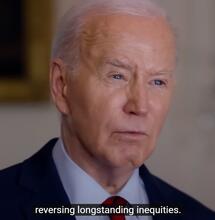Things Are Going Slow, Says New Cannabis Justice Report

The implementation of laws that offer relief to incarcerated individuals is falling behind. There’s much more that needs to be done in terms of providing protections and relief to those affected under previous cannabis laws at both federal and state level. These are some of the main conclusions we can draw by reading the State of Cannabis Justice report, prepared from The Last Prisoner Project.
The Last Prisoner Project issued a new report in light of the 1-year anniversary of President Biden’s much-applauded proclamation to push an end to federal cannabis prohibition. The purpose of the report is to urge action on some of the most pressing matters on the pathway to justice.
In an unprecedented speech that he gave last October, the president said that some 6,500 individuals, convicted for low-level cannabis offenses, would be released from federal prisons. In the same address, Biden also initiated a review process to reschedule or deschedule cannabis.
However, things have been moving pretty slowly. The report from Last Prisoner Project shows that, although promises were made, they haven’t been fully met, and many incarcerated individuals still remain where they are — in prison.
Legalization is Not Enough for Bringing Justice
What the State of Cannabis Justice Report says is that nobody has actually been released from prison. The scheduling review process has been initiated with the aim to move cannabis from Schedule I to Schedule III under the Controlled Substances Act. But for the release of some 3,000 incarcerated in federal prison, what would really need is a full deschedule of cannabis.
“Justice is not achieved through mere legalization alone but by undoing the harms caused by cannabis prohibition,” the report reads.
It then continues to sum up the current state of legal matters. “As of 2023, 23 states have enacted adult-use cannabis legalization, 24 states have enacted cannabis-specific record clearance laws, and 10 states have enacted cannabis-specific resentencing laws,” it says.
“Importantly, these criminal justice policies have become commonplace in recent legislation. In fact, since 2018, 100% of the 13% states that have legalized cannabis have included record clearance policies and since 2021 they have all been state-initiated,” the report adds.
The report notes that resentencing policies have been slower to take hold. They are in the legislation but their implementation is not at a pace that delivers real results. And it’s these legal provisions that can be of the greatest help to those that were harmed in the War on Drugs.
The report also illustrates that not enough is done at the state level to offer relief to affected individuals, despite some states having a strong statutory language, aimed exactly for that. Examples given include California, Minnesota, Maryland and New Mexico, who have all fallen behind in actually offering relief to those eligible, the report says.
California is past the deadline to effectuate record clearance, thus some 20,000 individuals still remain without relief. Minnesota has faced significant delays, while in Maryland it is not quite clear if the state has begun to enact the criminal justice provisions at all. Such trends are definitely something to worry about.
“These implementation struggles make it clear that statutory language is only a start to effective change, and this report only touches the surface in evaluating the accessibility of relief,” the report says. “The progress of cannabis justice is promising, but an evaluation of their status shows that there is still much to be done.”
Is There Anything You Can Do?
The Last Prisoner Project notes that its report will allow the public to compare, contrast and find out more about each state’s effort to improve the lives of those charged for cannabis-related offenses under previous legislation.
“We remain committed to dismantling the harmful legacy of the War on Drugs and ensuring that those affected by cannabis prohibition are not forgotten,” the report reads.
Beyond that, the Last Prisoner Project provides tools for everyone who wants to help and take small actions that can significantly change the life of those individuals impacted by past cannabis laws.
First, the majority of cannabis convicts happen to be convicts from state laws. What you can do is send a letter to your governor urging them to grant cannabis clemency. You can do this through the Pardons to Progress campaign.
And second, Last Prisoner Project is also behind the Pen to Right History campaign, which seeks to uplift the voices of those harmed by past cannabis laws. You can find out more about this campaign on the link here.
Also read on Soft Secrets:
- When Can Cannabis Lawyers Help?









